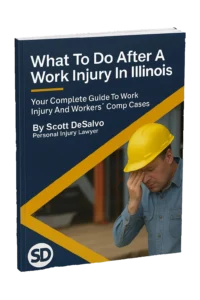One of the most frustrating situations in a workers' compensation case is when your doctor says you're ready to return to work, but you know your body isn't healed enough. Whether you were injured at a Chicago warehouse, Oak Brook office, Elgin factory, or anywhere in Illinois, you're probably asking yourself: "Can a doctor force you to go back to work?" or "What do I do when my doctor says I can work but I can't?"
This happens more often than you'd think in Illinois workers' compensation cases, especially when you're treating with a company doctor. The good news: a doctor cannot legally force you to return to work. However, if your doctor releases you and you refuse without valid medical reasons, you could lose your workers' compensation benefits.
As an experienced Illinois workers' compensation attorney who has handled thousands of cases throughout Cook County, DuPage County, and across Illinois, let me walk you through exactly what to do in this situation, how to protect yourself, and when you need to take action to preserve your rights under Illinois workers' compensation law.
Don't risk losing your workers' compensation benefits. If your company doctor released you to work but you're still in pain, unable to perform your job safely, or facing pressure from your employer, call us immediately for a free consultation with an experienced Illinois workers' compensation attorney.

First, here's something critical every injured worker needs to know about Illinois workers' compensation: anytime you visit your doctor for a work-related injury, you need a work status note. This note should maintain your current work status until your next appointment, when you'll get an updated note documenting your medical condition and ability to work.
What should you do with these workers' compensation work status notes? Send copies to three places:
• Your workers' compensation attorney
• The insurance or claims company handling your workers' comp case
• Your employer
This documentation is crucial because in Illinois workers' compensation law, you can receive temporary total disability (TTD) benefits while you're off work recovering from your workplace injury, but only when you have proper medical documentation. Unlike car accident cases, Illinois workers' compensation has specific provisions that require valid doctor's notes to receive benefits while recovering from work injuries.
Without these work status notes in your workers' compensation case, your benefits can be stopped—even if you're legitimately unable to work due to your workplace injury.
The situation where your doctor says you can work but you can't happens frequently in Illinois workers' compensation cases when you're treating with a company-recommended doctor. These are physicians suggested by your insurance company, workers' compensation claims adjuster, or employer to treat your workplace injury.
Here's what you need to understand about company doctors in workers' compensation cases: these physicians earn substantial income from treating patients referred by insurance companies and employers handling workers' comp claims. They see numerous workers' compensation patients throughout Illinois—from Chicago construction workers to suburban office employees—which creates a potential conflict of interest in your workers' comp case.
While they owe you medical care as their patient, they also have a financial incentive to keep the insurance company and your employer satisfied by minimizing workers' compensation claim costs.
How do they please these companies in workers' compensation cases? By minimizing claim costs, including sending you back to work quickly so they don't have to pay temporary disability benefits in your workers' comp case. You need to be aware of this dynamic when dealing with company doctors in Illinois workers' compensation claims.
This is why many Illinois injured workers choose to switch to independent doctors who don't have these conflicting loyalties in workers' compensation cases.

Legally, a doctor cannot physically force you to return to work in an Illinois workers' compensation case. However, if your doctor releases you to work and you refuse without valid medical reasons, you could lose your Illinois workers' compensation benefits.
This is why the situation is so complicated in workers' comp cases. If your treating doctor won't release you to work, you have protection under Illinois workers' compensation law. But if they do release you and you disagree with that medical assessment, you're in a more challenging position in your workers' compensation case.
Important: This applies whether you work in Chicago, the suburbs, or anywhere in Illinois—the same workers' compensation protections apply statewide to all workplace injuries.
If your doctor won't release you to work and you genuinely need more recovery time from your workplace injury, this is the ideal scenario in an Illinois workers' compensation case. Make sure you're getting those work status notes at every medical appointment and distributing them properly to your workers' compensation attorney, the insurance company, and your employer.
In this situation, Illinois workers' compensation law protects you. Your temporary total disability benefits should continue, and your medical treatment should be covered under workers' comp. If your employer or the insurance company tries to pressure you to return before you're medically cleared in your workers' compensation case, that could be illegal retaliation under Illinois law.
If you're facing pressure to return despite your doctor's orders in your workers' comp case, contact an Illinois workers' compensation attorney immediately to protect your rights.
This is the trickier situation in Illinois workers' compensation cases. Here are your options when facing this workers' comp dilemma:
The best solution in many Illinois workers' compensation cases is to switch to a doctor who will truly advocate for you rather than one with divided loyalties to insurance companies. However, timing matters here in workers' comp cases.
Switching doctors is easier earlier in your workers' compensation treatment. After surgery, it becomes difficult because orthopedic surgeons typically prefer not to provide post-operative follow-up care for workers' comp patients unless you need another surgery. Surgeons focus on surgical cases, not five-minute follow-ups and physical therapy prescriptions for someone else's workers' compensation patient.
The earlier in the process you can switch to a doctor who's on your side in your workers' comp case, the better your outcome will be.
Under Illinois workers' compensation law, you have the right to choose your own doctor after a brief period treating with the company doctor. Whether you're in Chicago, Oak Brook, Naperville, Elgin, Joliet, or anywhere else in Illinois, this right applies to you in your workers' compensation case. An experienced Illinois workers' compensation attorney can help you navigate the process of changing doctors while protecting your workers' comp benefits.
If you believe you might be able to work after your workers' compensation doctor releases you, even though you have doubts about your ability to perform your job duties safely, I usually recommend trying—but only if it's physically safe to do so. Here's why this approach works in many Illinois workers' compensation cases:
If you're absolutely certain that returning to work would be dangerous or cause significant harm to your workplace injury, don't do it. Instead, get an appointment with a different doctor for a thorough, fair examination and obtain proper documentation that you cannot work in your workers' compensation case.
However, if you think there's a possibility you could manage the work after your workers' comp injury, go ahead and try. If you successfully complete your duties, that's excellent. Sometimes our perception of our physical limitations after a workplace injury differs from reality, and there's nothing dishonest about discovering you're more capable than you thought in your workers' compensation recovery.
But if you attempt to work and find you cannot do it safely due to your workplace injury, here's what to do in your workers' comp case:
• Stop immediately if continuing would cause injury or significant pain related to your workers' compensation claim
• Schedule another appointment with your doctor as soon as possible to document your condition
• Document everything that happened during your attempt to work after your workers' comp injury
• Tell your doctor: "Doctor, I tried working for three days as you recommended in my workers' compensation case, but my back (or shoulder, or whatever body part) is now much worse."
This creates a medical record in your workers' compensation case showing you made a good-faith effort but were unable to perform the work safely due to your workplace injury.

Another common scenario in Illinois workers' compensation cases involves light duty or modified work after a workplace injury. For example, if you had shoulder surgery due to a workers' comp injury, your doctor might release you for "modified duty, left-handed work only" instead of keeping you off completely.
Sometimes employers will bring you in for an eight-hour shift in workers' compensation cases but give you essentially nothing to do. Under Illinois workers' compensation law, there's limited recourse in this situation—though it's frustrating, at least you're still receiving your regular wages while recovering from your workplace injury.
Here's where you need to be vigilant in your Illinois workers' compensation case. If you have a one-handed work restriction due to your workplace injury but your employer puts you right back into two-handed work—typing all day, carpentry, factory work requiring both hands—take these steps to protect your workers' comp case:
• Inform your supervisor immediately that the assigned work exceeds your medical restrictions in your workers' compensation case
• Document everything in writing if possible (send an email or text about your workers' comp work restrictions)
• Contact your doctor as soon as possible to report the violation of your restrictions
• Tell your doctor: "You gave me a one-handed work restriction for my workers' compensation injury, but they're requiring me to do full duty work with both hands."
"Scott is absolutely fantastic. He will always go the extra mile for his clients. They always take the time to return phone calls at all hours and I highly recommend him to all my friends."
-Melissa Brooks
"Great people and Scott's a great lawyer. They helped me make the wisest decision for my case, and that's important in serious legal matters. I trust him completely. He is the one to call."
-Tony Skvarenina
"Beyond satisfied with the services I received from this law firm. Definitely recommend! They got me fully paid and all the doctor bills, too. If you want the best, this is the law firm for your injury case!"
-Cynthia Rodriguez
"Scott represented me and I was really pleased with everything, my car accident paid a lot and quick. If you want a good Lawyer who is responsive, and straight with you, I highly recommend him."
-Greg Garcia
If your doctor is fair and ethical in your workers' comp case, they'll respond to this information by writing a note taking you completely off work. They should document in your medical records that you returned to work willing to perform modified duties in your workers' compensation case, but your employer assigned you full duty work that violated your restrictions and posed a danger to your recovery from your workplace injury.
This documentation becomes crucial for your Illinois workers' compensation case because it shows you made a good-faith effort to return to work within your restrictions, but your employer failed to accommodate your medical limitations required by your workers' comp treatment.

Here are actual situations Illinois workers face in workers' compensation cases when doctors release them too early after workplace injuries:
• Construction worker with back injury: Your doctor clears you for "light duty" in your workers' comp case, but your employer puts you back to lifting 50-pound materials on a South Side construction site—well above your restrictions from your workplace injury.
• Office worker with carpal tunnel: Released to work after surgery in your workers' compensation case, but typing all day at your Loop office causes severe pain and swelling within hours due to your workplace injury.
• Warehouse worker with shoulder injury: Doctor says you can work "modified duty" in your workers' comp case, but your Elgin warehouse employer assigns you the same overhead reaching and lifting that caused your workplace injury.
• CTA worker with knee injury: Cleared to return in your workers' compensation case but standing all day on a bus or train causes your knee to swell and buckle from your workplace injury.
• Healthcare worker with back strain: Released to work at your suburban hospital in your workers' comp case, but patient transfers and lifting exceed your physical capacity after your workplace injury.
• Manufacturing worker with hand injury: Your Naperville factory job requires repetitive gripping in your workers' compensation case, but your doctor released you too soon and your hand can't maintain the pace after your workplace injury.
• Retail worker with foot injury: Standing 8-hour shifts at your Oak Park store causes intense pain in your workers' comp case despite being "cleared" to work after your workplace injury.
If any of these sound familiar in your workers' compensation situation, you have options. You don't have to choose between your health and your workers' comp benefits after a workplace injury.
Contact an Illinois workers' compensation attorney immediately if you experience any of these situations in your workers' comp case:
H3: Medical Issues in Workers' Compensation Cases:
✗ Your company doctor releases you to full duty despite ongoing pain and limitations from your workplace injury
✗ You're sent to an Independent Medical Exam (IME) doctor who contradicts your treating physician in your workers' comp case
✗ Your doctor dismisses your complaints or rushes you through appointments for your workplace injury
✗ You're told "pain is normal" in your workers' compensation case when you can't perform basic job functions
✗ Your doctor suggests you can "work through it" despite documented workplace injury
H3: Employer Pressure in Workers' Compensation Cases:
✗ Your employer pressures you to return before your doctor clears you in your workers' compensation case
✗ You're threatened with job loss for following your doctor's work restrictions after your workplace injury
✗ Your employer assigns you work that violates your documented restrictions in your workers' comp case
✗ You're told to "try working" when you know it's medically unsafe after your workplace injury
✗ Your employer refuses to accommodate reasonable restrictions in your workers' compensation case
✗ You're given meaningless tasks to justify keeping you at work after your workers' comp injury
✗ Your boss calls repeatedly while you're on medical leave for your workplace injury
H3: Benefits Issues in Workers' Compensation Cases:
✗ Your workers' comp benefits are cut off even though you have valid work status notes
✗ The insurance company disputes your need for time off without medical basis in your workers' compensation case
✗ Your temporary disability payments stop suddenly after your workplace injury
✗ You're told there are "no light duty positions available" at a large company in your workers' comp case
✗ The claims adjuster suggests you're "milking" your workers' compensation injury
H3: Retaliation in Workers' Compensation Cases:
✗ You're fired or disciplined for being unable to work due to your workers' compensation injury
✗ Your position is eliminated while you're on medical leave for your workplace injury
✗ You return to work and immediately face hostility or different treatment in your workers' comp case
✗ You're excluded from meetings, shifts, or opportunities after filing workers' compensation
These situations often constitute illegal retaliation or bad faith under Illinois workers' compensation law. Don't face them alone—most workers' compensation attorneys work on contingency with no upfront costs for workplace injury cases.

Get Your FREE Copy of...
Your complete guide to work injury and Workers Comp to give you everything you need to know if you or a loved one has been hurt at work.
Many doctors in Illinois understand how workers' compensation cases work and will genuinely advocate for their injured worker patients. You deserve to be treated by one of these physicians who doesn't have conflicting loyalties to insurance companies or your employer in your workers' comp case.
If you have any concerns or resistance from your company doctor in your workers' compensation case, switching to an independent physician is worth the effort. Your recovery from your workplace injury and your financial compensation depend on having accurate medical documentation from a doctor who puts your health first in your workers' comp case.
Whether you're in Chicago, the suburbs, or anywhere in Illinois, you have the right to choose a doctor who will truly represent your medical interests in your workers' compensation case. Don't let anyone tell you otherwise about your rights in workers' comp claims.
I know navigating these scenarios can feel overwhelming. Illinois workers' compensation cases have many moving parts, especially when dealing with work restrictions, company doctors, and conflicting opinions about your ability to work after a workplace injury.
The stakes are high in workers' comp cases: your health, your family's financial security, and your future ability to work all depend on getting proper medical treatment and documentation now. Making the wrong move in your workers' compensation case—whether it's returning to work too soon or refusing a legitimate work release—can have serious consequences for your workers' comp benefits.
This is exactly why having experienced legal guidance matters in Illinois workers' compensation cases. Whether you were injured at work, in a car accident, or in another type of incident, getting a free consultation from an experienced workers' compensation attorney can clarify your options and protect your rights.
Can my doctor force me to go back to work in Illinois workers' compensation?
No, a doctor cannot physically force you to return to work in an Illinois workers' compensation case. However, if your doctor releases you to work and you refuse to return without valid medical reasons, you could lose your Illinois workers' compensation benefits. The key in workers' comp cases is having medical documentation supporting your inability to work after your workplace injury. If you disagree with your company doctor's assessment in your workers' compensation case, you have the right to seek a second opinion or switch to an independent physician who can give you a fair medical evaluation of your workplace injury.
What do I do if my company doctor releases me but I'm still in pain in my workers' compensation case?
You have three main options in your Illinois workers' compensation case: (1) Switch to an independent doctor who can give you a fair evaluation of your workplace injury—this is often the best long-term solution in workers' comp cases, (2) Try working if it's safe to do so after your workers' compensation injury, but stop immediately and document any problems to report back to your doctor, or (3) Seek a second opinion from another physician before attempting to return in your workers' comp case. The earlier you switch to a doctor who advocates for you rather than the insurance company in your workers' compensation case, the better your case outcome will be after your workplace injury.
How do I switch doctors in an Illinois workers' compensation case?
Under Illinois workers' compensation law, you generally have the right to choose your own treating physician after an initial period with the company doctor. The process in workers' comp cases involves notifying the insurance company and your employer in writing of your intent to change doctors, selecting a new physician who accepts workers' compensation cases and treats workplace injuries, and ensuring proper medical records transfer. Contact an Illinois workers' compensation attorney to help you navigate this process correctly—timing matters in workers' comp cases, and there are specific procedures you must follow to avoid jeopardizing your workers' compensation benefits.
What if my employer makes me work beyond my medical restrictions in my workers' compensation case?
Immediately inform your supervisor in writing (email or text) that the assigned work exceeds your medical restrictions in your Illinois workers' compensation case. Document everything: what restrictions your doctor gave you for your workplace injury, what work you were assigned, how it violates those restrictions in your workers' comp case, and any symptoms or problems that result. Then contact your doctor right away and explain: "Doctor, you gave me [specific restriction] for my workers' compensation injury, but my employer is requiring me to perform [specific duties] that exceed those limitations." Your doctor should document this violation in your medical records and may take you completely off work in your workers' comp case. This creates crucial evidence showing you tried to comply with restrictions after your workplace injury but your employer failed to accommodate them.
Can I lose my job for not being ready to return to work after a workers' compensation injury?
While Illinois is an at-will employment state, firing someone specifically because they're legitimately recovering from a workers' compensation injury can be illegal retaliation under Illinois law. If you have valid medical documentation in your workers' comp case that you cannot work and you're following your doctor's orders for your workplace injury, termination for that reason may violate Illinois workers' compensation retaliation protections. However, if you're permanently unable to return to your job after your workers' comp injury and there's no reasonable accommodation available, the situation becomes more complex. If you're facing termination in your workers' compensation case, consult with a workers' comp attorney immediately to understand your rights and options.
How long can I stay off work with workers' compensation in Illinois?
There's no specific time limit for how long you can be off work with workers' compensation in Illinois—it depends entirely on your medical condition from your workplace injury and your doctor's opinion in your workers' comp case. You can remain off work as long as your treating physician certifies you're temporarily totally disabled and unable to work due to your workers' compensation injury. Some workplace injuries may require only a few weeks off, while serious workers' comp injuries like major surgeries, spinal injuries, or complex fractures could require months or even longer. The key in workers' compensation cases is ongoing medical documentation supporting your inability to work after your workplace injury. Your temporary total disability (TTD) benefits in your workers' comp case continue until: your doctor releases you to return to work, you reach maximum medical improvement (MMI), or your workers' compensation case is settled.
What if I try to work but can't do it after my workers' compensation injury?
Stop immediately if continuing would cause injury or significant pain in your workers' compensation case—don't risk making your workplace injury worse. Schedule an appointment with your doctor as soon as possible (ideally within 24-48 hours) and document everything in your workers' comp case: exactly what duties you attempted, how long you tried to work after your workplace injury, what symptoms or problems developed, and why you couldn't safely continue. Tell your doctor: "I tried working as you recommended in my workers' compensation case, but [specific body part] got much worse—I experienced [specific symptoms]." This creates a medical record showing you made a good-faith effort to return to work but couldn't safely perform the job after your workplace injury. Your doctor should then document this attempt and your worsening condition, which strengthens your workers' comp case if the insurance company questions your need for continued time off.
Do I need a lawyer if my doctor says I can work but I can't in my workers' compensation case?
You should consult a workers' compensation attorney if: your company doctor is rushing you back to work against your better judgment in your workers' comp case, your employer is pressuring you to return before your doctor releases you after your workplace injury, your workers' compensation benefits are being delayed or denied, your employer threatens termination for following medical restrictions in your workers' comp case, the insurance company sends you to an IME doctor who contradicts your treating physician, you're approaching maximum medical improvement and unsure about your options in your workers' compensation case, or you need help switching to an independent doctor for your workplace injury. An attorney can protect your rights and ensure you receive all workers' comp benefits you're entitled to under Illinois law. Most workers' compensation attorneys work on contingency, meaning no upfront costs—you only pay if you win your workers' comp case.
What's the difference between temporary total disability (TTD) and modified duty in workers' compensation?
Temporary total disability (TTD) in Illinois workers' compensation cases means you're completely unable to work due to your workplace injury and receive weekly wage replacement payments (typically about 2/3 of your average weekly wage). Modified or light duty in workers' comp cases means your doctor has released you to work with restrictions after your workplace injury—for example, "no lifting over 10 pounds" or "seated work only." When you're on modified duty in your workers' compensation case, you return to work within your restrictions, and if your employer cannot accommodate those restrictions, you may continue receiving TTD benefits. The distinction is important in workers' comp cases because accepting a modified duty release that you cannot actually perform can jeopardize your TTD benefits after your workplace injury.
What if two doctors disagree about whether I can work in my workers' compensation case?
This happens frequently in Illinois workers' compensation cases, especially when your treating physician says you need more time off from your workplace injury but the insurance company's IME doctor says you can return to work. Under Illinois workers' compensation law, your treating physician's opinion generally carries more weight than an Independent Medical Exam doctor in workers' comp cases, especially since your treating physician has an ongoing relationship with you and has been managing your care for your workplace injury. If there's a medical dispute in your workers' compensation case, you may need to request an expedited hearing before an arbitrator to resolve the disagreement. A workers' compensation attorney can help you navigate this process and present medical evidence supporting your treating physician's restrictions after your workplace injury.
Free Consultation Available 24/7 for Workers' Compensation Cases
Call Now: 312-500-4500
Not ready to talk? Tell me about your workers' comp case online
--> Go To Main Topic Page

Scott DeSalvo founded DeSalvo Law to help injured people throughout Chicago and surrounding suburbs. Licensed to practice law in Illinois since 1998, IARDC #6244452, Scott has represented over 3,000 clients in personal injury, workers compensation, and accident cases.
No Fee Unless You Win | Free Consultation | 24/7 Availability Call or Text: (312) 500-4500
>>Read More
Main Office:
1000 Jorie Blvd Ste 204
Oak Brook, IL 60523
New Cases: 312-500-4500
Office: 312-895-0545
Fax: 866-629-1817
service@desalvolaw.com
Chicago and Other Suburban Offices
By Appointment Only